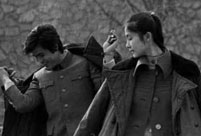No country with a normal development strategy will be willing to tolerate Japan’s attempt to become a military power. Japan denies its history and challenges the post-war international order.
Led by nationalist Prime Minister Shinzo Abe, the Japanese government approved its first national security strategy on Tuesday. New defense program guidelines and a mid-term defense buildup plan were adopted.
According to the national security strategy document, Japan will seek a more "proactive" security role for the Self-Defense Forces abroad, and will set new guidelines on arms exports, signaling a major shift from the country's previous policy of restraint. To camouflage the country's intemperate ambition of becoming a military power, Abe has dressed his schemes in the guise of a plan to become a "proactive contributor to peace."
The strategy also relies on a strong Japan-U.S. security alliance as a counterbalance to any threat to Japan.
Earlier this month, Japan's "Tokyo Shimbun" published an editorial pointing out that a series of moves on security policy taken by the Abe government may fundamentally change the commitment to build a peaceful country made by Japan after World War II.
A few days ago, Abe said in an interview to reporters that for him, this year's theme word is "dream". Although Abe linked his own dreams with Tokyo's successful bid for the Olympics, it is apparent that he has another dream that he would rather not discuss in too much detail, but whose intention can be discerned behind his new defense policy package.
The defense package is critical to Japan’s national development and will also affect regional security. As a result, countries throughout the world will maintain a vigilant attitude to Abe’s “dream”.
Valery Keith Tarnoff, director of the Far East Institute of the Russian Academy of Sciences Research Center for Japan believes the change in Japan's national security strategy shows that Japan aims to become a genuine military power.
Japan is gradually diverging from a pacifist country, said an article published by “The New York Times”. Abe wants to get rid of the postwar consensus and restore an outdated and dangerous Cold War mentality.
Bloomberg made the point that Abe has a broader ambition to make reclaim Asian leadership for this island nation.
In Abe, people seem to see the shadow of his grandfather, Nobusuke Kishi, a Class A war criminal. Ian Buruma, Dutch writer and scholar, has written on the subject: Nobusuke Kishi was a nationalist with fascist tendencies during the 1930s and 1940s... His lifelong ambition was to alter Japan's pacifist constitution drafted by the United States after World War II and enable Japan to become a military power again... To complete his grandfather’s unfinished business is Abe’s greatest wish... to abandon the pacifist constitution and deny Japan’s war crimes.
More than twenty years have passed since the end of the Cold War. Currently, the international community shares common interests and is interdependent. Peace, development, cooperation and win-win are the contemporary trends. But Abe is still trapped in a dream of dominating Asia, denying the results of the World War II, and returning to the path of military buildup.
Any country with a normal development strategy will not tolerate Japan’s attempt to become a military power. Japan is denying its history and challenging the post-war international order.
 Heavy cargo flights taking off
Heavy cargo flights taking off In pictures: PLA's digital equipment
In pictures: PLA's digital equipment  Americans mark Thanksgiving Day with parades
Americans mark Thanksgiving Day with parades Love searching stories in cities
Love searching stories in cities  Shanghai shrouded in heavy fog
Shanghai shrouded in heavy fog Office ladies receive ‘devil’ training in mud
Office ladies receive ‘devil’ training in mud Changes in Chinese dancing culture
Changes in Chinese dancing culture  Highlight of Mr Bodybuilding and Miss Bikini Contest
Highlight of Mr Bodybuilding and Miss Bikini Contest  Picturesque scenery of Huanglong, NW China
Picturesque scenery of Huanglong, NW China Escort fleet conducts replenishment
Escort fleet conducts replenishment Jinan Int'l Airport welcomes passenger
Jinan Int'l Airport welcomes passenger Hukou reforms target 2020: official
Hukou reforms target 2020: official Record of Chinese expressions in 2013
Record of Chinese expressions in 2013 Pole dancing team show their moves in snow
Pole dancing team show their moves in snow Blind-date party for civil servants in Beijing
Blind-date party for civil servants in Beijing Day|Week|Month